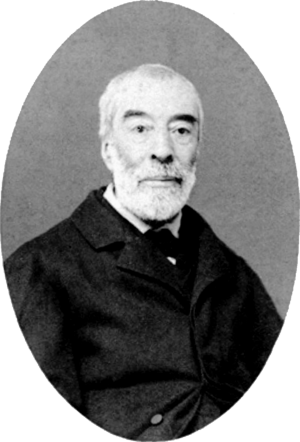Charles Renouvier facts for kids
Quick facts for kids
Charles Renouvier
|
|
|---|---|

Charles Renouvier in 1883
|
|
| Born | 1 January 1815 |
| Died | 1 September 1903 (aged 88) |
| Alma mater | École Polytechnique |
| Era | 19th-century philosophy |
| Region | Western philosophy |
| School | Critical philosophy |
|
Main interests
|
Metaphysics |
|
Notable ideas
|
Néo-criticisme, uchronia |
|
Influences
|
|
|
Influenced
|
|
Charles Bernard Renouvier (born January 1, 1815 – died September 1, 1903) was an important French philosopher. He saw himself as someone who wanted to update the ideas of Kant about liberalism (which means focusing on individual rights and freedoms) and individualism for the changing world of the late 1800s. His ideas also influenced the way Émile Durkheim, a famous sociologist, studied society.
Contents
Biography
Renouvier was born in Montpellier, France. He studied in Paris at a famous school called the École Polytechnique. He was interested in politics from a young age. However, he never held a public job. Instead, he spent his time writing, away from public attention.
Philosophy
Renouvier was the first French philosopher in a long time to create a complete system of idealism. Idealism is a way of thinking that says reality is mostly made of ideas or minds, not just physical things. His ideas greatly influenced French thought. His system was based on the work of Immanuel Kant, a very famous German philosopher. Renouvier even called his philosophy "néo-criticisme" (neo-criticism), which means "new criticism," showing his connection to Kant. However, it was more of a new version than just a continuation of Kant's ideas.
Key Ideas
Renouvier's philosophy had two main ideas:
- He disliked anything "unknowable."
- He strongly believed in the importance of personal experience.
Dislike of the Unknowable
Renouvier didn't like the idea of anything that couldn't be known or understood. This led him to accept Kant's idea of phenomenalism. This means we can only know things as they appear to us, not as they are in themselves. Renouvier rejected Kant's idea of the "thing-in-itself," which was a mysterious, unknowable reality behind what we experience.
He also argued against other mysterious ideas. For example, he didn't believe in a "Substantial Soul" (a hidden, unchanging part of us) or an "Infinite Spiritual Substance" (a mysterious, all-encompassing spiritual being). He also argued against the idea of a hidden material or energy source that explains the world, which some naturalistic thinkers believed in. Renouvier thought that nothing exists except our "presentations," which are like our experiences or perceptions. These aren't just feelings; they have an objective side (they relate to the world outside us) as well as a subjective side (they are part of our personal experience). To explain how our experiences are organized, Renouvier used a changed version of Kant's "categories," which are like mental frameworks we use to understand the world.
Importance of Personal Experience
Renouvier believed strongly that our personal experiences are real and important. This led him to a big difference from Kant when it came to volition, which means the power of using your will. Renouvier said that liberty (freedom) is the most important quality of humans, even more so than Kant thought. He believed that human freedom works in the world we experience, not in some imaginary, hidden world.
He also thought that belief isn't just about thinking or using your intellect. Instead, it's shaped by an act of will. This means we choose to believe what we think is morally good.
Religious Views
In his religious ideas, Renouvier was quite similar to another philosopher named Gottfried Leibniz. Renouvier believed that we are rationally justified (it makes sense to believe) in saying that humans can be immortal (live forever) and that there is a God. However, he thought this God was "finite," meaning not all-powerful or limitless. This God would be like a constitutional ruler, guiding people's souls, but not a complete dictator. Interestingly, he thought that being an atheist (not believing in God) was better than believing in an infinite, limitless God.
The Actual Infinite
Renouvier's dislike of the "unknowable" also made him argue against the idea of an "actual infinite." This is the idea of something that is truly endless or completed in its endlessness. He believed that an infinite sum (like counting "one, two, three..." forever) must always be incomplete. You can never reach a point where you can shout "infinity!" For Renouvier, infinity is something you work towards, a project, but never a finished fact.
Influence on William James
Renouvier became a very important influence on the American psychologist and philosopher William James. James wrote that if it weren't for Renouvier's strong arguments for pluralism (the idea that there are many different realities or truths, not just one), he might never have escaped the idea of "monism" (the belief that everything is one single reality) that he grew up with.
Works
- Essais de critique générale (1854–64)
- Science de la morale (1869)
- Uchronie (1876)
- Comment je suis arrivé à cette conclusion (1885)
- Esquisse d'une classification systématique des doctrines philosophiques (1885–86)
- Philosophie analytique de l'histoire (1896–97)
- La Nouvelle Monadologie (1899)
- Histoire et solution des problèmes métaphysiques (1901)
- Victor Hugo: Le Poète (1893)
- Victor Hugo: Le Philosophe (1900)
- Les Dilemmes de la métaphysique pure (1901)
- Le Personnalisme (1903)
- Critique de la doctrine de Kant (1906)
See also
 In Spanish: Charles Renouvier para niños
In Spanish: Charles Renouvier para niños
- Neo-Kantianism
 | William L. Dawson |
 | W. E. B. Du Bois |
 | Harry Belafonte |

